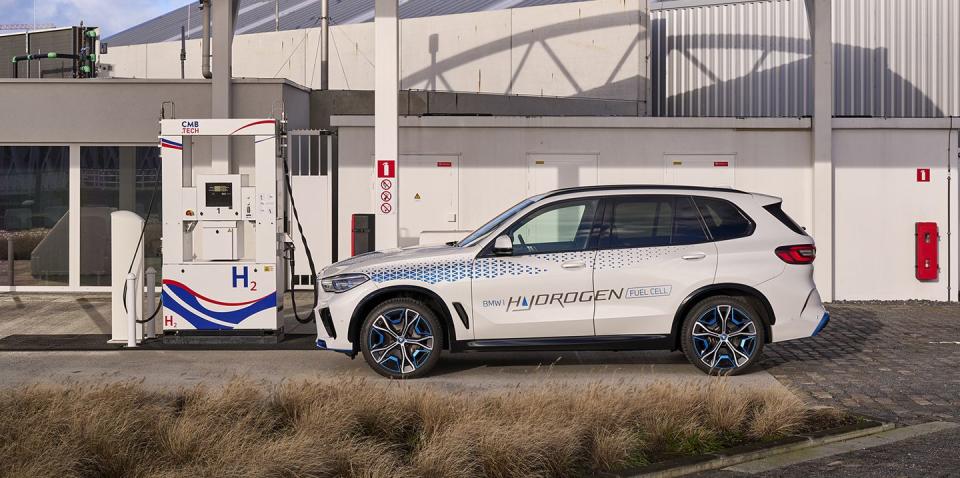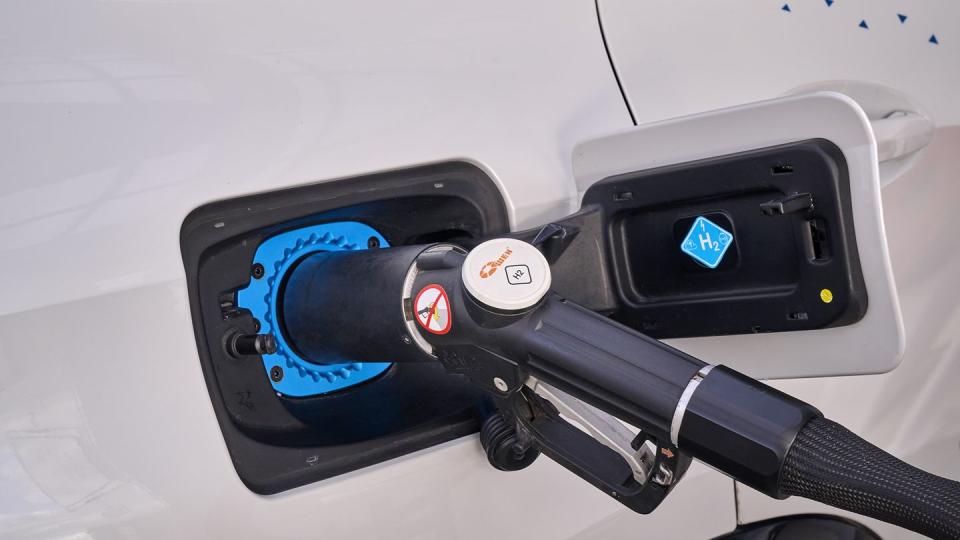Here’s Why BMW Is Still Betting on Hydrogen

BMW launches first batch of iX5 Hydrogen vehicles, following up on decades of BMW Group research in hydrogen powertrains.
The iX5 features Toyota fuel cells and the EV hardware of the BMW iX, along with a small 2.0-kWh battery.
BMW does not plan to sell or lease the nearly 100 units of the iX5 it plans to produce, only intending them for demonstration purposes.
A few months after it began building the fuel cells for the BMW iX5, the automaker has officially launched the first batch of hydrogen-fueled sport utilities. BMW is just one of a handful, along with Toyota and Hyundai, to have developed passenger cars powered by hydrogen amid a significant turn toward EVs in the past year.
The BMW iX5 couples fuel cells made by Toyota with what is essentially an EV drivetrain borrowed from the BMW iX, along with a small 2.0-kWh lithium-ion battery. The result is an output of 395 hp, with the 16 pounds of hydrogen aboard giving the sport utility a range of 310 miles in the WLTP cycle.
The automaker doesn't intend to sell or lease any of these vehicles. Instead, like many others before them including the 7-Series hydrogen cars, the iX5 will be part of an eventual fleet of fewer than 100 units that will be used for demonstration purposes.
"This active driving experience will therefore be the first chance for people not involved in the development process to gain a direct impression of what the BMW iX5 Hydrogen has to offer," as the automaker puts it.
The iX5 is built at BMW Group's special pilot plant, located at the Research and Innovation Centre (FIZ) in Munich. That's where the unique components of this drivetrain are fitted to X5 chassis, with the plant employing approximately 900 workers, including specialists in hydrogen fuel. The build cost per unit, therefore, is perhaps best left unsaid if you were to get behind the wheel of one of these and take it into real traffic, and we suspect that some internal-combustion cars from a certain Goodwood-based unit of the BMW Group could seem like a bargain.
But despite BMW experimenting with hydrogen for decades at this point, we're not really any closer to being able to buy a hydrogen fuel-cell BMW or be able to fuel it in many places outside some parts of California.
So why is BMW still investing in this technology—enough to hand build a fleet of SUVs that will never be sold to the public?

"Hydrogen is a versatile energy source that has a key role to play in the energy transition process and therefore in climate protection. After all, it is one of the most efficient ways of storing and transporting renewable energies," says Oliver Zipse, Chairman of the Board of Management of BMW AG.
To be sure, BMW is spending far more money developing EVs than it is spending on hydrogen tech. But it still sees a role for hydrogen in the future, at least in western Europe, where networks of stations are currently being develop to facilitate hydrogen-powered trucks running routes from port cities to manufacturing centers. In many ways hydrogen in the trucking sector is seeing more interest from automakers and trucking companies alike, even as the cost of hydrogen fuel has recently risen.
BMW effectively envisions a future where hydrogen cars will claim a small piece of the entire ZEV market, and could see support from governments in the form of purchase incentives. This scenario, of course, relies on a future where the number of hydrogen stations will grow from around 100 in Germany today, to around 500 or more by the end of the decade.
This scenario still depends on a number of factors, such as the trucking and other heavy industries pulling hydrogen in the right direction, with possible increases in the price of gasoline and diesel providing a tailwind.
"Hydrogen is the missing piece in the jigsaw when it comes to emission-free mobility. One technology on its own will not be enough to enable climate-neutral mobility worldwide," Zipse added.
Still, it's difficult to ignore the fact that in the past 20 years far more progress on hydrogen was expected to occur. Instead, we've largely seen lukewarm progress in EV adoption, which was given an unexpected boost in Europe three years ago. From the viewpoint of 2003, both EVs and hydrogen cars were supposed to be far more commonplace than they are today, with the industry still waiting for an EV-like tipping point.
Should BMW and other automakers keep experimenting with hydrogen cars, or devote more attention to EVs at this point? Let us know in the comments below.

 Yahoo Autos
Yahoo Autos 